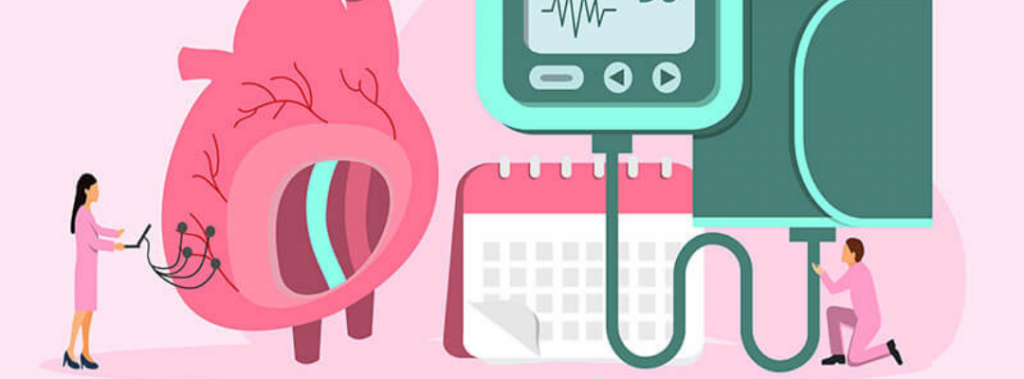What is Hypertension?
Hypertension is a fairly common problem in Singapore. Slightly less than 1 in 4 Singapore residents aged 30 to 69 years have hypertension. The older you are, the more likely you are to have hypertension. In the 60 – 69 years age group, more than 1 in 2 persons have hypertension.
Blood Pressure (BP) is described by two numbers, for example, if your BP is 120/80, the systolic BP is 120mmHg and the diastolic BP is 80mmHg.
You have hypertension if your systolic BP is 140mmHg or more, or your diastolic BP is 90mmHg or more, or both (mmHg is millimetres of mercury , a measure of pressure).
Causes and risk factors
In 95% of cases, the cause of hypertension is unknown. In 5% of cases, hypertension may be due to causes such as kidney disease, narrowing of certain blood vessels or hormonal imbalance. Certain risk factors increase the chance of developing hypertension. These include obesity and diabetes.
Signs and symptoms
Hypertension is often called the silent killer . This is because, even when severe, it may not give rise to any symptoms.
Occasionally, you may have headaches or giddiness when the hypertension is severe. However, these symptoms are not specific to hypertension; they are also present in other diseases.
Sometimes, hypertension is only discovered when complications set in, for example, a stroke or heart attack.
Complications
Hypertension increases the risk of developing atherosclerosis (hardening and narrowing of the arteries). If untreated or inadequately treated, hypertension can cause the following problems:
- Coronary heart disease
- Heart failure
- Stroke
- Peripheral artery disease (narrowing of the blood vessels of the limbs)
- Kidney failure
The risk of suffering from the complications of hypertension is increased if you:
- Are a smoker
- Suffer from diabetes
- Have high blood cholesterol
- Are overweight (BMI of 23kg/m2 or higher)
Screening and diagnosis
If you are diagnosed with hypertension, your doctor will:
- Take a medical history
- Examine you
- Check for signs of complications e.g. heart failure
- Do relevant blood and urine tests
- Do a chest X-ray
- Do an ECG (electrocardiogram
So here we have 6 ways on how to prevent from Hypertension.
Making an effort to prevent high blood pressure can reduce your risk of heart attack, stroke, and other serious illnesses. If you are at risk for hypertension, take these steps to help prevent it.
High blood pressure, which is also called hypertension, increases your risk of developing many serious health problems, including heart disease, stroke, and kidney disease. It is estimated that nearly one out of every three Americans has high blood pressure.
While you can’t always control whether you get high blood pressure, there are healthy lifestyle habits you can develop to help prevent hypertension and reduce your risk of high blood pressure-related health problems in the future.
To avoid a hypertension diagnosis, make these healthy lifestyle choices.
1. Maintain a healthy weight. When it comes to hypertension prevention, your weight is crucial. People who are overweight should try to lose weight, and people of normal weight should avoid adding on any pounds. If you are carrying extra weight, losing as little as 10 pounds can help prevent high blood pressure. Talk with your doctor about the best weight for you.
2. Eat a balanced diet. Eating healthful foods can help keep your blood pressure under control. Get plenty of fruits and vegetables, especially those rich in potassium, and limit your intake of excess calories, fat, and sugar. Consider following the Dietary Approaches to Stop Hypertension, or DASH, diet, which has been shown to help manage blood pressure.
3. Cut back on salt. For many people, eating a low-sodium diet can help keep blood pressure normal. “The higher the sodium intake, the higher the blood pressure,”. You can cut back on your total salt intake by avoiding high-sodium packaged and processed foods and not adding extra salt to your meals. “I tell people to stay away from salt shakers.”
4. Exercise regularly. Get moving to prevent hypertension. “Physical activity is crucial.” The more exercise you get, the better, but even a little bit can help control blood pressure. Moderate exercise for about 30 minutes three times a week is a good start.
5. Limit the alcohol. Drinking too much alcohol can lead to high blood pressure. For women, that means no more than one drink a day, and for men, no more than
6. Monitor your blood pressure. Make sure that you have your blood pressure measured regularly, either at your doctor’s office or at home. High blood pressure often occurs with no symptoms, so only blood pressure readings will tell you if your blood pressure is on the rise. If your doctor determines that you have prehypertension — blood pressure in the range of 120-139/80-89 millimetres of mercury (mmHg) that puts you at increased risk of developing hypertension — your doctor may recommend extra steps as a safeguard.
Take a look at your lifestyle habits and decide where you can make changes to help prevent hypertension. Conquer small goals, such as snacking on fruits and vegetables instead of junk food, and continue to practice these good habits until they are a part of your daily routine.



